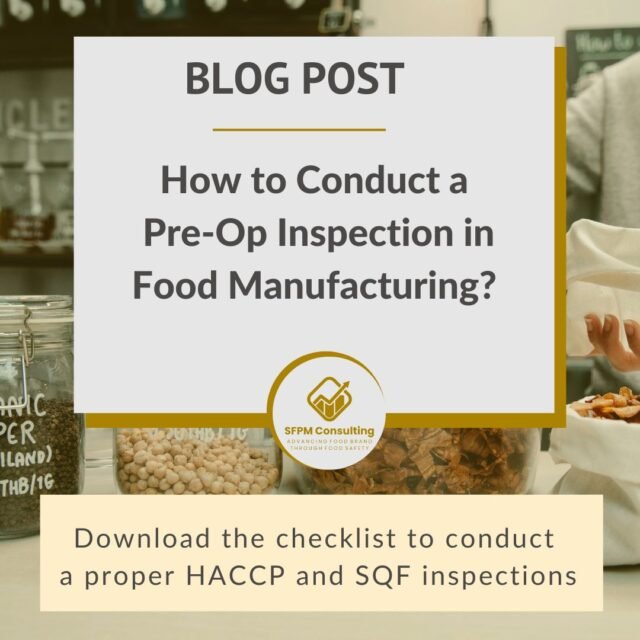Ensuring the safety and quality of food products is paramount in the food manufacturing industry. One critical step in achieving this is conducting a thorough pre-operational (pre-op) inspection. This essential process helps identify and address potential issues before production begins, safeguarding the integrity of your products. In this blog post, we’ll guide you through the step-by-step process of conducting a pre-op inspection in food manufacturing, highlighting what to look for and why it’s crucial not to compromise on safety. Download our comprehensive pre-op starter checklist to ensure your inspections are thorough and effective.
Understanding the Importance of Pre-Operational Inspections
Pre-operational inspections are a vital component of quality assurance in food manufacturing. These inspections serve as the first line of defense against contamination and other hazards that could compromise the safety and integrity of food products. By conducting a pre-op inspection, wecan identify and rectify issues before production begins, ensuring that the final product meets all safety and quality standards. This proactive approach protects consumers and helps maintain the manufacturer’s reputation and compliance with regulatory requirements.
Preparing for the Pre-Op Inspection
Preparation is key to a successful pre-op inspection. Use a pre-op checklist. Ensure that all team members involved in the inspection are trained and understand their roles and responsibilities. Clear communication and coordination are essential to thoroughly cover all areas and aspects of the inspection. Additionally, review any previous inspection reports to identify recurring issues or areas that require special attention.
Here are the areas that must be included as part of your Pre-Operational Inspection:
Conducting the Visual Inspection
The visual inspection is a critical component of the pre-op process. This step involves thoroughly examining the production area, equipment, and utensils for any signs of contamination, damage, or wear and tear. Look for visible residues, rust, cracks, or other defects that could harbour bacteria or compromise food safety. Pay special attention to hard-to-reach areas and ensure all surfaces are clean and sanitized. Document any findings and take immediate corrective actions to address any issues identified during the visual inspection.
Verifying Equipment Cleanliness and Functionality
We must ensure all equipment is clean and functioning correctly before start-up. Use the pre-op checklist to verify that all machinery, tools, and utensils have been properly cleaned and sanitized. Check for any signs of malfunction or damage that could affect the production process. Test equipment to ensure it operates as intended and meets all safety and quality standards. Properly maintained equipment enhances product quality and reduces the risk of contamination and production downtime.
Assessing Environmental Conditions
Environmental conditions play a significant role in food safety and quality. Factors such as temperature, humidity, and ventilation in the production area must be assessed during the pre-op inspection. We must ensure that these conditions do not contribute to food safety risks. Additionally, check for any potential sources of contamination, such as leaks, pests, or improper waste disposal. Address any environmental issues promptly to maintain a safe and sanitary production environment.
Implementing Corrective Actions and Follow-Up
Identifying issues during a pre-op inspection is only the first step; implementing corrective actions is equally important. Remember to follow up and address any deficiencies or areas of concern identified during the inspection. Make sure your production areas and environments are suitable for production before use.
Conducting a thorough pre-op inspection is essential for ensuring the safety and quality of food products in the manufacturing industry. Don’t compromise on the safety and integrity of your food products – start implementing effective pre-op inspections today. Download our pre-op checklist to get started and ensure your products meet the highest quality and safety standards.
If you are new to the food industry, we can help you conduct your pre-op correctly and manage the corrective actions. Let us know by booking a call through this link:
https://tidycal.com/sfpmconsulting/strategy-call

